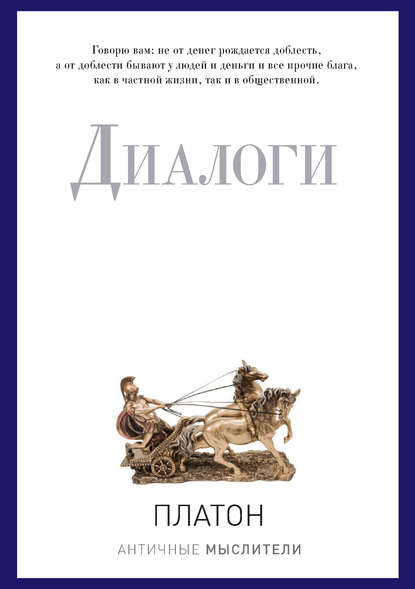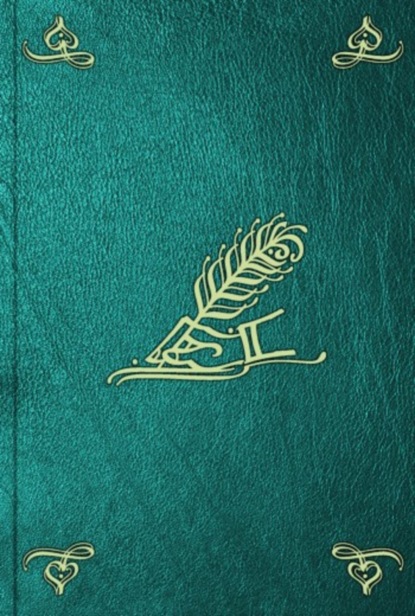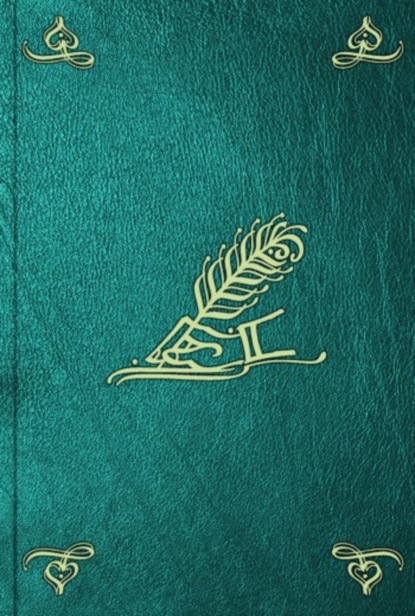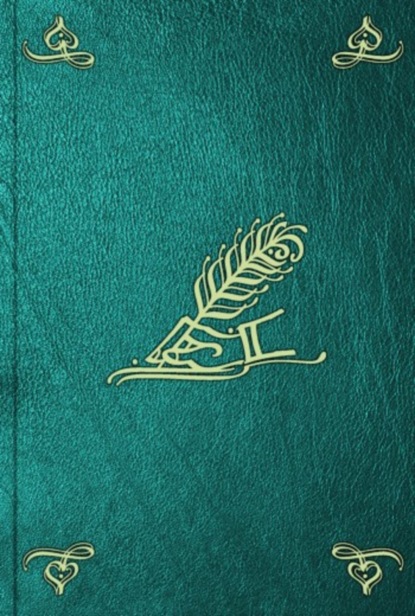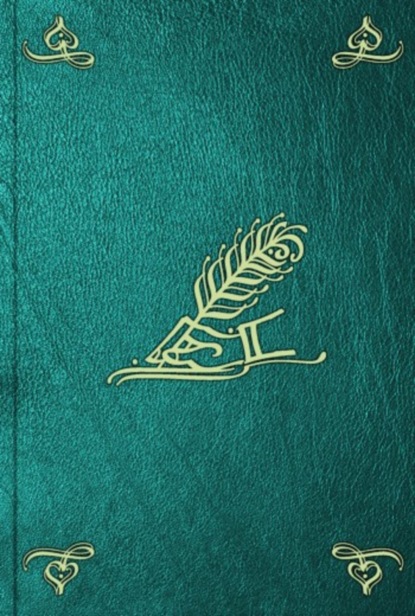 Полная версия
Полная версияПолная версия:
Платон The Republic
- + Увеличить шрифт
- - Уменьшить шрифт

Plato
The Republic
INTRODUCTION AND ANALYSIS
The Republic of Plato is the longest of his works with the exception of the Laws, and is certainly the greatest of them. There are nearer approaches to modern metaphysics in the Philebus and in the Sophist; the Politicus or Statesman is more ideal; the form and institutions of the State are more clearly drawn out in the Laws; as works of art, the Symposium and the Protagoras are of higher excellence. But no other Dialogue of Plato has the same largeness of view and the same perfection of style; no other shows an equal knowledge of the world, or contains more of those thoughts which are new as well as old, and not of one age only but of all. Nowhere in Plato is there a deeper irony or a greater wealth of humour or imagery, or more dramatic power. Nor in any other of his writings is the attempt made to interweave life and speculation, or to connect politics with philosophy. The Republic is the centre around which the other Dialogues may be grouped; here philosophy reaches the highest point (cp, especially in Books V, VI, VII) to which ancient thinkers ever attained. Plato among the Greeks, like Bacon among the moderns, was the first who conceived a method of knowledge, although neither of them always distinguished the bare outline or form from the substance of truth; and both of them had to be content with an abstraction of science which was not yet realized. He was the greatest metaphysical genius whom the world has seen; and in him, more than in any other ancient thinker, the germs of future knowledge are contained. The sciences of logic and psychology, which have supplied so many instruments of thought to after-ages, are based upon the analyses of Socrates and Plato. The principles of definition, the law of contradiction, the fallacy of arguing in a circle, the distinction between the essence and accidents of a thing or notion, between means and ends, between causes and conditions; also the division of the mind into the rational, concupiscent, and irascible elements, or of pleasures and desires into necessary and unnecessary – these and other great forms of thought are all of them to be found in the Republic, and were probably first invented by Plato. The greatest of all logical truths, and the one of which writers on philosophy are most apt to lose sight, the difference between words and things, has been most strenuously insisted on by him (cp. Rep.; Polit.; Cratyl. 435, 436 ff), although he has not always avoided the confusion of them in his own writings (e.g. Rep.). But he does not bind up truth in logical formulae, – logic is still veiled in metaphysics; and the science which he imagines to 'contemplate all truth and all existence' is very unlike the doctrine of the syllogism which Aristotle claims to have discovered (Soph. Elenchi, 33. 18).
Neither must we forget that the Republic is but the third part of a still larger design which was to have included an ideal history of Athens, as well as a political and physical philosophy. The fragment of the Critias has given birth to a world-famous fiction, second only in importance to the tale of Troy and the legend of Arthur; and is said as a fact to have inspired some of the early navigators of the sixteenth century. This mythical tale, of which the subject was a history of the wars of the Athenians against the Island of Atlantis, is supposed to be founded upon an unfinished poem of Solon, to which it would have stood in the same relation as the writings of the logographers to the poems of Homer. It would have told of a struggle for Liberty (cp. Tim. 25 C), intended to represent the conflict of Persia and Hellas. We may judge from the noble commencement of the Timaeus, from the fragment of the Critias itself, and from the third book of the Laws, in what manner Plato would have treated this high argument. We can only guess why the great design was abandoned; perhaps because Plato became sensible of some incongruity in a fictitious history, or because he had lost his interest in it, or because advancing years forbade the completion of it; and we may please ourselves with the fancy that had this imaginary narrative ever been finished, we should have found Plato himself sympathising with the struggle for Hellenic independence (cp. Laws, iii. 698 ff.), singing a hymn of triumph over Marathon and Salamis, perhaps making the reflection of Herodotus (v. 78) where he contemplates the growth of the Athenian empire – 'How brave a thing is freedom of speech, which has made the Athenians so far exceed every other state of Hellas in greatness!' or, more probably, attributing the victory to the ancient good order of Athens and to the favor of Apollo and Athene (cp. Introd. to Critias).
Again, Plato may be regarded as the 'captain' ('arhchegoz') or leader of a goodly band of followers; for in the Republic is to be found the original of Cicero's De Republica, of St. Augustine's City of God, of the Utopia of Sir Thomas More, and of the numerous other imaginary States which are framed upon the same model. The extent to which Aristotle or the Aristotelian school were indebted to him in the Politics has been little recognised, and the recognition is the more necessary because it is not made by Aristotle himself. The two philosophers had more in common than they were conscious of; and probably some elements of Plato remain still undetected in Aristotle. In English philosophy too, many affinities may be traced, not only in the works of the Cambridge Platonists, but in great original writers like Berkeley or Coleridge, to Plato and his ideas. That there is a truth higher than experience, of which the mind bears witness to herself, is a conviction which in our own generation has been enthusiastically asserted, and is perhaps gaining ground. Of the Greek authors who at the Renaissance brought a new life into the world Plato has had the greatest influence. The Republic of Plato is also the first treatise upon education, of which the writings of Milton and Locke, Rousseau, Jean Paul, and Goethe are the legitimate descendants. Like Dante or Bunyan, he has a revelation of another life; like Bacon, he is profoundly impressed with the unity of knowledge; in the early Church he exercised a real influence on theology, and at the Revival of Literature on politics. Even the fragments of his words when 'repeated at second-hand' (Symp. 215 D) have in all ages ravished the hearts of men, who have seen reflected in them their own higher nature. He is the father of idealism in philosophy, in politics, in literature. And many of the latest conceptions of modern thinkers and statesmen, such as the unity of knowledge, the reign of law, and the equality of the sexes, have been anticipated in a dream by him.
The argument of the Republic is the search after Justice, the nature of which is first hinted at by Cephalus, the just and blameless old man – then discussed on the basis of proverbial morality by Socrates and Polemarchus – then caricatured by Thrasymachus and partially explained by Socrates – reduced to an abstraction by Glaucon and Adeimantus, and having become invisible in the individual reappears at length in the ideal State which is constructed by Socrates. The first care of the rulers is to be education, of which an outline is drawn after the old Hellenic model, providing only for an improved religion and morality, and more simplicity in music and gymnastic, a manlier strain of poetry, and greater harmony of the individual and the State. We are thus led on to the conception of a higher State, in which 'no man calls anything his own,' and in which there is neither 'marrying nor giving in marriage,' and 'kings are philosophers' and 'philosophers are kings;' and there is another and higher education, intellectual as well as moral and religious, of science as well as of art, and not of youth only but of the whole of life. Such a State is hardly to be realized in this world and quickly degenerates. To the perfect ideal succeeds the government of the soldier and the lover of honour, this again declining into democracy, and democracy into tyranny, in an imaginary but regular order having not much resemblance to the actual facts. When 'the wheel has come full circle' we do not begin again with a new period of human life; but we have passed from the best to the worst, and there we end. The subject is then changed and the old quarrel of poetry and philosophy which had been more lightly treated in the earlier books of the Republic is now resumed and fought out to a conclusion. Poetry is discovered to be an imitation thrice removed from the truth, and Homer, as well as the dramatic poets, having been condemned as an imitator, is sent into banishment along with them. And the idea of the State is supplemented by the revelation of a future life.
The division into books, like all similar divisions (Cp. Sir G.C. Lewis in the Classical Museum, vol. ii. p 1.), is probably later than the age of Plato. The natural divisions are five in number; – (1) Book I and the first half of Book II down to the paragraph beginning, 'I had always admired the genius of Glaucon and Adeimantus,' which is introductory; the first book containing a refutation of the popular and sophistical notions of justice, and concluding, like some of the earlier Dialogues, without arriving at any definite result. To this is appended a restatement of the nature of justice according to common opinion, and an answer is demanded to the question – What is justice, stripped of appearances? The second division (2) includes the remainder of the second and the whole of the third and fourth books, which are mainly occupied with the construction of the first State and the first education. The third division (3) consists of the fifth, sixth, and seventh books, in which philosophy rather than justice is the subject of enquiry, and the second State is constructed on principles of communism and ruled by philosophers, and the contemplation of the idea of good takes the place of the social and political virtues. In the eighth and ninth books (4) the perversions of States and of the individuals who correspond to them are reviewed in succession; and the nature of pleasure and the principle of tyranny are further analysed in the individual man. The tenth book (5) is the conclusion of the whole, in which the relations of philosophy to poetry are finally determined, and the happiness of the citizens in this life, which has now been assured, is crowned by the vision of another.
Or a more general division into two parts may be adopted; the first (Books I – IV) containing the description of a State framed generally in accordance with Hellenic notions of religion and morality, while in the second (Books V – X) the Hellenic State is transformed into an ideal kingdom of philosophy, of which all other governments are the perversions. These two points of view are really opposed, and the opposition is only veiled by the genius of Plato. The Republic, like the Phaedrus (see Introduction to Phaedrus), is an imperfect whole; the higher light of philosophy breaks through the regularity of the Hellenic temple, which at last fades away into the heavens. Whether this imperfection of structure arises from an enlargement of the plan; or from the imperfect reconcilement in the writer's own mind of the struggling elements of thought which are now first brought together by him; or, perhaps, from the composition of the work at different times – are questions, like the similar question about the Iliad and the Odyssey, which are worth asking, but which cannot have a distinct answer. In the age of Plato there was no regular mode of publication, and an author would have the less scruple in altering or adding to a work which was known only to a few of his friends. There is no absurdity in supposing that he may have laid his labours aside for a time, or turned from one work to another; and such interruptions would be more likely to occur in the case of a long than of a short writing. In all attempts to determine the chronological order of the Platonic writings on internal evidence, this uncertainty about any single Dialogue being composed at one time is a disturbing element, which must be admitted to affect longer works, such as the Republic and the Laws, more than shorter ones. But, on the other hand, the seeming discrepancies of the Republic may only arise out of the discordant elements which the philosopher has attempted to unite in a single whole, perhaps without being himself able to recognise the inconsistency which is obvious to us. For there is a judgment of after ages which few great writers have ever been able to anticipate for themselves. They do not perceive the want of connexion in their own writings, or the gaps in their systems which are visible enough to those who come after them. In the beginnings of literature and philosophy, amid the first efforts of thought and language, more inconsistencies occur than now, when the paths of speculation are well worn and the meaning of words precisely defined. For consistency, too, is the growth of time; and some of the greatest creations of the human mind have been wanting in unity. Tried by this test, several of the Platonic Dialogues, according to our modern ideas, appear to be defective, but the deficiency is no proof that they were composed at different times or by different hands. And the supposition that the Republic was written uninterruptedly and by a continuous effort is in some degree confirmed by the numerous references from one part of the work to another.
The second title, 'Concerning Justice,' is not the one by which the Republic is quoted, either by Aristotle or generally in antiquity, and, like the other second titles of the Platonic Dialogues, may therefore be assumed to be of later date. Morgenstern and others have asked whether the definition of justice, which is the professed aim, or the construction of the State is the principal argument of the work. The answer is, that the two blend in one, and are two faces of the same truth; for justice is the order of the State, and the State is the visible embodiment of justice under the conditions of human society. The one is the soul and the other is the body, and the Greek ideal of the State, as of the individual, is a fair mind in a fair body. In Hegelian phraseology the state is the reality of which justice is the idea. Or, described in Christian language, the kingdom of God is within, and yet developes into a Church or external kingdom; 'the house not made with hands, eternal in the heavens,' is reduced to the proportions of an earthly building. Or, to use a Platonic image, justice and the State are the warp and the woof which run through the whole texture. And when the constitution of the State is completed, the conception of justice is not dismissed, but reappears under the same or different names throughout the work, both as the inner law of the individual soul, and finally as the principle of rewards and punishments in another life. The virtues are based on justice, of which common honesty in buying and selling is the shadow, and justice is based on the idea of good, which is the harmony of the world, and is reflected both in the institutions of states and in motions of the heavenly bodies (cp. Tim. 47). The Timaeus, which takes up the political rather than the ethical side of the Republic, and is chiefly occupied with hypotheses concerning the outward world, yet contains many indications that the same law is supposed to reign over the State, over nature, and over man.
Too much, however, has been made of this question both in ancient and modern times. There is a stage of criticism in which all works, whether of nature or of art, are referred to design. Now in ancient writings, and indeed in literature generally, there remains often a large element which was not comprehended in the original design. For the plan grows under the author's hand; new thoughts occur to him in the act of writing; he has not worked out the argument to the end before he begins. The reader who seeks to find some one idea under which the whole may be conceived, must necessarily seize on the vaguest and most general. Thus Stallbaum, who is dissatisfied with the ordinary explanations of the argument of the Republic, imagines himself to have found the true argument 'in the representation of human life in a State perfected by justice, and governed according to the idea of good.' There may be some use in such general descriptions, but they can hardly be said to express the design of the writer. The truth is, that we may as well speak of many designs as of one; nor need anything be excluded from the plan of a great work to which the mind is naturally led by the association of ideas, and which does not interfere with the general purpose. What kind or degree of unity is to be sought after in a building, in the plastic arts, in poetry, in prose, is a problem which has to be determined relatively to the subject-matter. To Plato himself, the enquiry 'what was the intention of the writer,' or 'what was the principal argument of the Republic' would have been hardly intelligible, and therefore had better be at once dismissed (cp. the Introduction to the Phaedrus).
Is not the Republic the vehicle of three or four great truths which, to Plato's own mind, are most naturally represented in the form of the State? Just as in the Jewish prophets the reign of Messiah, or 'the day of the Lord,' or the suffering Servant or people of God, or the 'Sun of righteousness with healing in his wings' only convey, to us at least, their great spiritual ideals, so through the Greek State Plato reveals to us his own thoughts about divine perfection, which is the idea of good – like the sun in the visible world; – about human perfection, which is justice – about education beginning in youth and continuing in later years – about poets and sophists and tyrants who are the false teachers and evil rulers of mankind – about 'the world' which is the embodiment of them – about a kingdom which exists nowhere upon earth but is laid up in heaven to be the pattern and rule of human life. No such inspired creation is at unity with itself, any more than the clouds of heaven when the sun pierces through them. Every shade of light and dark, of truth, and of fiction which is the veil of truth, is allowable in a work of philosophical imagination. It is not all on the same plane; it easily passes from ideas to myths and fancies, from facts to figures of speech. It is not prose but poetry, at least a great part of it, and ought not to be judged by the rules of logic or the probabilities of history. The writer is not fashioning his ideas into an artistic whole; they take possession of him and are too much for him. We have no need therefore to discuss whether a State such as Plato has conceived is practicable or not, or whether the outward form or the inward life came first into the mind of the writer. For the practicability of his ideas has nothing to do with their truth; and the highest thoughts to which he attains may be truly said to bear the greatest 'marks of design' – justice more than the external frame-work of the State, the idea of good more than justice. The great science of dialectic or the organisation of ideas has no real content; but is only a type of the method or spirit in which the higher knowledge is to be pursued by the spectator of all time and all existence. It is in the fifth, sixth, and seventh books that Plato reaches the 'summit of speculation,' and these, although they fail to satisfy the requirements of a modern thinker, may therefore be regarded as the most important, as they are also the most original, portions of the work.
It is not necessary to discuss at length a minor question which has been raised by Boeckh, respecting the imaginary date at which the conversation was held (the year 411 B.C. which is proposed by him will do as well as any other); for a writer of fiction, and especially a writer who, like Plato, is notoriously careless of chronology (cp. Rep., Symp., 193 A, etc.), only aims at general probability. Whether all the persons mentioned in the Republic could ever have met at any one time is not a difficulty which would have occurred to an Athenian reading the work forty years later, or to Plato himself at the time of writing (any more than to Shakespeare respecting one of his own dramas); and need not greatly trouble us now. Yet this may be a question having no answer 'which is still worth asking,' because the investigation shows that we cannot argue historically from the dates in Plato; it would be useless therefore to waste time in inventing far-fetched reconcilements of them in order to avoid chronological difficulties, such, for example, as the conjecture of C.F. Hermann, that Glaucon and Adeimantus are not the brothers but the uncles of Plato (cp. Apol. 34 A), or the fancy of Stallbaum that Plato intentionally left anachronisms indicating the dates at which some of his Dialogues were written.
The principal characters in the Republic are Cephalus, Polemarchus, Thrasymachus, Socrates, Glaucon, and Adeimantus. Cephalus appears in the introduction only, Polemarchus drops at the end of the first argument, and Thrasymachus is reduced to silence at the close of the first book. The main discussion is carried on by Socrates, Glaucon, and Adeimantus. Among the company are Lysias (the orator) and Euthydemus, the sons of Cephalus and brothers of Polemarchus, an unknown Charmantides – these are mute auditors; also there is Cleitophon, who once interrupts, where, as in the Dialogue which bears his name, he appears as the friend and ally of Thrasymachus.
Cephalus, the patriarch of the house, has been appropriately engaged in offering a sacrifice. He is the pattern of an old man who has almost done with life, and is at peace with himself and with all mankind. He feels that he is drawing nearer to the world below, and seems to linger around the memory of the past. He is eager that Socrates should come to visit him, fond of the poetry of the last generation, happy in the consciousness of a well-spent life, glad at having escaped from the tyranny of youthful lusts. His love of conversation, his affection, his indifference to riches, even his garrulity, are interesting traits of character. He is not one of those who have nothing to say, because their whole mind has been absorbed in making money. Yet he acknowledges that riches have the advantage of placing men above the temptation to dishonesty or falsehood. The respectful attention shown to him by Socrates, whose love of conversation, no less than the mission imposed upon him by the Oracle, leads him to ask questions of all men, young and old alike, should also be noted. Who better suited to raise the question of justice than Cephalus, whose life might seem to be the expression of it? The moderation with which old age is pictured by Cephalus as a very tolerable portion of existence is characteristic, not only of him, but of Greek feeling generally, and contrasts with the exaggeration of Cicero in the De Senectute. The evening of life is described by Plato in the most expressive manner, yet with the fewest possible touches. As Cicero remarks (Ep. ad Attic. iv. 16), the aged Cephalus would have been out of place in the discussion which follows, and which he could neither have understood nor taken part in without a violation of dramatic propriety (cp. Lysimachus in the Laches).
His 'son and heir' Polemarchus has the frankness and impetuousness of youth; he is for detaining Socrates by force in the opening scene, and will not 'let him off' on the subject of women and children. Like Cephalus, he is limited in his point of view, and represents the proverbial stage of morality which has rules of life rather than principles; and he quotes Simonides (cp. Aristoph. Clouds) as his father had quoted Pindar. But after this he has no more to say; the answers which he makes are only elicited from him by the dialectic of Socrates. He has not yet experienced the influence of the Sophists like Glaucon and Adeimantus, nor is he sensible of the necessity of refuting them; he belongs to the pre-Socratic or pre-dialectical age. He is incapable of arguing, and is bewildered by Socrates to such a degree that he does not know what he is saying. He is made to admit that justice is a thief, and that the virtues follow the analogy of the arts. From his brother Lysias (contra Eratosth.) we learn that he fell a victim to the Thirty Tyrants, but no allusion is here made to his fate, nor to the circumstance that Cephalus and his family were of Syracusan origin, and had migrated from Thurii to Athens.
